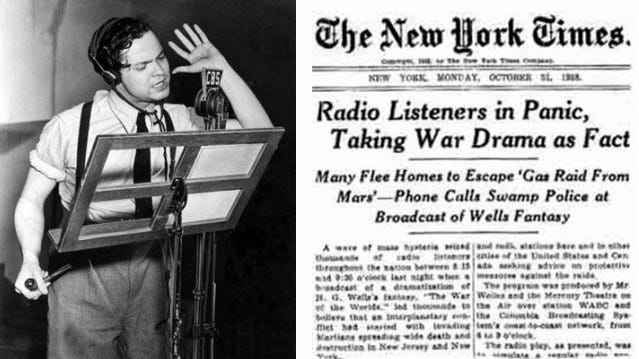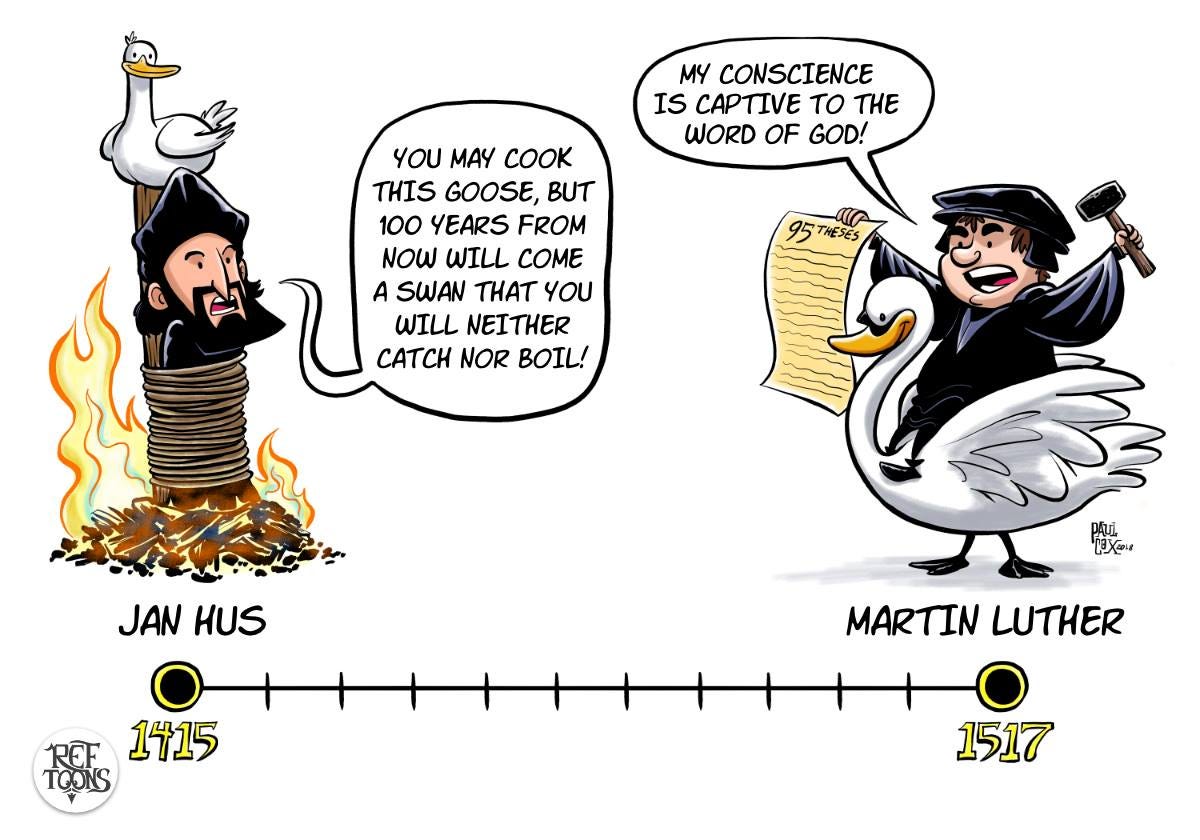The Illusion of Authority:
How New Media Cannibalizes the Old World
When Orson Wells aired ‘The War of the Worlds’ in 1938, he sparked mass panic across the United States — because people believed that his fictional radio show was a real public service announcement.
But it wasn’t–Wells was an entertainer, not a public figure.
He used the radio to entertain his audience, not to inform them.
But, because the audience had been so accustomed to receiving information from the radio and not entertainment of this kind, they all thought this entertainer, in this moment, was an authority informing them of facts and not fictions.
When I first heard this story, it was told as proof of Orson Wells’ brilliance.
But, after watching and listening to the three hour long Joe Rogan podcast between Douglas Murray and Dave Smith, I have realized something else about this strange moment in the history of media: it is a perfect demonstration of how ill-equipped human societies are to deal with new media.
Today’s new medium is the internet and everything it has spawned.
The new medium in the first half of the 20th century was the radio.
Before the radio, the largest media transformation was the invention of the printing press in the 15th century.
I could waste a tremendous amount of time and ink discussing the pros and cons of new media vs. old media, but I would rather leave that to the culture warriors and focus on the historical realities that new media force upon society at large and why major changes in the media landscape typically lead to large-scale violence.
All media is communication.
We use these things as means of communicating ideas to others, and major media revolutions happen when new technology is invented that allows a communicator to communicate their ideas to an exponentially larger audience than the previous media allowed for.
New media, therefore, is always more powerful than old media.
Less than 100 years after the printing press was invented, Catholicism, the largest social force in Europe for over 1000 years, had lost its grip on European society, and the whole continent of Europe was plunged into religious war that would last for another 300 years.
Martin Luther, however, was not the first person to criticize the corruption of Catholicism, the restriction of information by its gatekeepers, and the arrogance of its defenders.
The Catholic Church, much like the gatekeepers of the old media today, had a stranglehold on the distribution of information to the public for hundreds of years.
Because manuscripts had to be copied by hand, and most of the copyists were Catholic monks, the church could determine how and what information would be distributed to the public.
In the same way that TV news channels and major newspapers could control what would come before the eyes of the public in the past 50 years, the gatekeepers, simply by choosing what to distribute and what not to distribute, controlled the entire distributing of information in Europe.
In 1415, 100 years before Luther’s Reformation, a man named Jan Hus made almost the exact same critique as Luther.
However, because the printing press had not yet been invented, there was no way for his ideas to reach the public.
He was burned at the stake promising that one day another critic would come who would uproot the issues in Catholicism.
(Don’t ask me how I came across this informative
And then there was Luther.
And, after Luther broke open the seal and his ideas spread across Europe, hundreds of other critics followed him.
And, in their wake, war, chaos, and devastation.
Because information had been kept so closely guarded for so long, the public was accustomed to receiving highly reviewed and processed content.
The problem with this, of course, is that the public was on a highly curated information diet.
The benefit, however, is that the information they received was verified by a significant number of people and there were checks to ensure that it would not incite violence etc…,. (Except, of course, in the cases where the information was designed to incite violence.)
People were accustomed to receiving highly curated and reviewed information before the invention of the printing press.
However, after the printing press, the information they were receiving was neither curated nor reviewed, yet they still expected the new media to have the same authority as the old.
The Authority Illusion
This is the informational gap that new media causes – the audience is accustomed to the veracity of the old media which the new media does not possess.
New media suffers from the Authority Illusion, which is the illusion that the content of the new media has the same authority as the old.
The Authority Illusion: The mistaken belief that the content of new media carries the same editorial authority, integrity, or fact-checking process as the old media it replaces.
Therefore, the audience assumes a far higher level of truth from new media than it actually has.
And that is what we saw on display in the Douglas Murray and Dave Smith Podcast.
The podcast wasn’t a debate — I refuse to call it one.
It was a collision between two media paradigms and two worldviews: the old and the new. Murray spoke the language of the old; Smith spoke the language of the new.
Neither truly heard the other.
In the old media world, Murray would have won. But this wasn’t the old media world. It wasn’t even a debate. It was a clash of paradigms: Murray spoke the language of institutions; Smith, the language of the internet.
Murray might have won the rhetorical dispute, but Smith won the crowd.
In a real debate, Murray would have been the uncontested winner, but this was not a debate.
What happened between Douglas Murray and Dave Smith was something new, something that has not really existed before.
It was something closer to a solipsistic exchange between two voices who could not hear each other.
(With no definitive authorities in the world of new media, there is no way to determine the winner of a debate.)
There was Douglas Murray, somewhat ironically, representing the old media, and there was Dave Smith, representing the new.
He would have won because he presented his opponent’s arguments as the product of nothing more than conjecture, imagination, the recycling of the ideas of others.
However, this exchange did not happen in the world of old media – it happened on Joe Rogan’s podcast. Which, for better or worse, seems to be the largest public forum in the world.
But, unlike the forum of ancient Rome, this podcast has no barriers to entry other than Rogan himself.
And Rogan himself has made it very clear that he is not interested in gatekeeping – he just invites whoever he finds interesting to the show.
Where Murray presented Smith’s arguments as the simplistic understanding of geopolitics one could develop from his mother’s basement, Smith presented Murray’s arguments as the pretentious whining of an old-media man lamenting the collapse of the old order to which he was a part.
And, unfortunately, he succeeded.
In Jewish spaces and Jewish discourse, Murray was the undisputed winner.
In the comments on the podcast itself, however, among Rogan’s 100 million plus fans, Murray came across as an egotistically smarmy Brit who seemed more interested in scolding Dave and Joe for not “trusting the experts” on anything.
The irony of all of this, unfortunately, is that few people have been as critical of the old media and the old expert class as Douglas Murray.
The old media had been collapsing for years, but the final death knell rang after the Covid Lab Leak Theory was vindicated, and the entire media landscape, which not only rejected it but scorned anyone who mentioned it, was proven wrong.
The Joe Rogan Podcast was one of the only media platforms that even discussed it, and Rogan and his fans were right.
Not only were they right, but, while the evidence was still not certain, the entire class of old media experts belittled them, mocked them, and called them conspiracy theorists.
After many years of this mudslinging from the old media at the new, and after the new media was vindicated and the old media was embarrassed, no one wants to believe or listen to anyone about the dangers, real or imagined, or new media from an “expert.”
But two things can be true at once.
The old media can be corrupt, privileged, and wrong, and the new media can be unverified, unchecked, and dangerous.
Ultimately, the real danger of new media is the same as it was when the printing press and the radio were invented.
Franklin D. Roosevelt was famous for his fireside chats – for the way he used the radio to speak directly into the homes of Americans during the Great Depression.
The radio made it possible for someone like Roosevelt to speak directly to millions of people.
However, it also allowed Hitler to do the same.
The Americans who heard Orson Wells’ presentation of The War of the Worlds believed him because they were accustomed to hearing truth on the radio and reading truth in the newspapers.
The Germans who heard Hitler’s presentation of the Jews as the ultimate enemy of the world believed him for the same reason.
The internet is our new form of media, and we are seriously in danger of falling victim to the same historical trend.
One of the great difficulties with this is that the old media and its defenders have lost all of their credibility.
I began publishing on Substack because the gates of the old media are all designed to keep me out.
It’s true – the old media is corrupt.
But that does not mean that the new media is correct.
These dynamics, though, are not political – they are historical.
The New Battle for the New World
We cannot defeat the truthlessness of new media by complaining that it is truthless – we can only defeat it by bringing truth into the new media.
And so, given that is the case, The Zionist Voice will be developing a podcast with the intention of presenting the Zionist argument for the new world.
Too many Jewish and Zionist organizations are old world. They live in the old media, they are fighting the old world’s fights, and they have no idea how to relate to a new generation of people who have been educated and reared by the internet.
If you, or anyone you know, knows anything about producing a podcast, please DM me. And, if you are interested in funding and financing such a thing, please DM me even more.
It is time to fight this rhetorical war on the battlefield of modern discourse.
Truth must prevail.
Spread Love, Spread Light,
Am Yisrael Chai
~






Good for you! Create new paradigms.
I would argue that the crowd already had its mind made up and thinks that Smith merely validated their bias. Rogan's audience are made up largely of low IQ, angry far right gen Z males who already hate Jews. I wonder why such a pampered and privileged generation are always so angry and take to extremist ideologies of the hard left and right. Far from representing old establishment media, Douglas Murray's pro-Israel views are an outlier among his peers. The rabid Jew-haters on the far right though actually think legacy media is pro-Israel. The irony is that David Smith's take on Gaza is exactly the propaganda that's coming from old media like the BBC and American networks.
............................................................................................................................................................
"Murray might have won the rhetorical dispute, but Smith won the crowd".